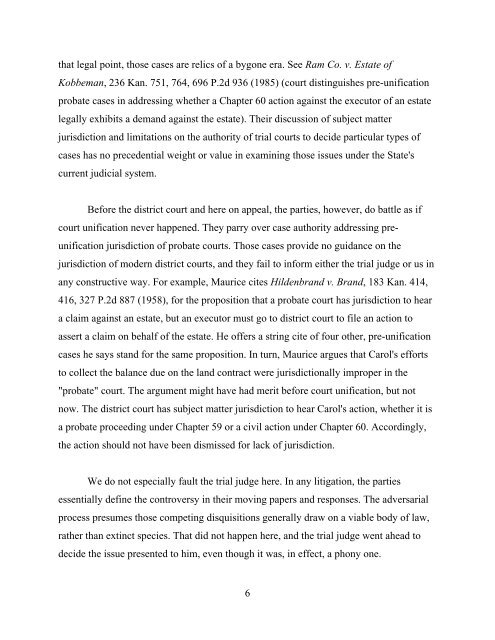103047 - Kansas Judicial Branch
103047 - Kansas Judicial Branch
103047 - Kansas Judicial Branch
Create successful ePaper yourself
Turn your PDF publications into a flip-book with our unique Google optimized e-Paper software.
that legal point, those cases are relics of a bygone era. See Ram Co. v. Estate of<br />
Kobbeman, 236 Kan. 751, 764, 696 P.2d 936 (1985) (court distinguishes pre-unification<br />
probate cases in addressing whether a Chapter 60 action against the executor of an estate<br />
legally exhibits a demand against the estate). Their discussion of subject matter<br />
jurisdiction and limitations on the authority of trial courts to decide particular types of<br />
cases has no precedential weight or value in examining those issues under the State's<br />
current judicial system.<br />
Before the district court and here on appeal, the parties, however, do battle as if<br />
court unification never happened. They parry over case authority addressing preunification<br />
jurisdiction of probate courts. Those cases provide no guidance on the<br />
jurisdiction of modern district courts, and they fail to inform either the trial judge or us in<br />
any constructive way. For example, Maurice cites Hildenbrand v. Brand, 183 Kan. 414,<br />
416, 327 P.2d 887 (1958), for the proposition that a probate court has jurisdiction to hear<br />
a claim against an estate, but an executor must go to district court to file an action to<br />
assert a claim on behalf of the estate. He offers a string cite of four other, pre-unification<br />
cases he says stand for the same proposition. In turn, Maurice argues that Carol's efforts<br />
to collect the balance due on the land contract were jurisdictionally improper in the<br />
"probate" court. The argument might have had merit before court unification, but not<br />
now. The district court has subject matter jurisdiction to hear Carol's action, whether it is<br />
a probate proceeding under Chapter 59 or a civil action under Chapter 60. Accordingly,<br />
the action should not have been dismissed for lack of jurisdiction.<br />
We do not especially fault the trial judge here. In any litigation, the parties<br />
essentially define the controversy in their moving papers and responses. The adversarial<br />
process presumes those competing disquisitions generally draw on a viable body of law,<br />
rather than extinct species. That did not happen here, and the trial judge went ahead to<br />
decide the issue presented to him, even though it was, in effect, a phony one.<br />
6

















